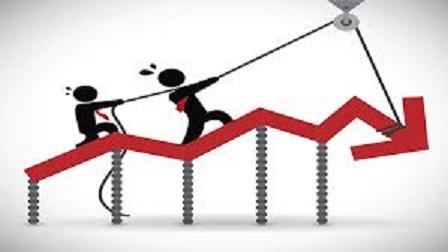Africa-Press – Mauritius. Just like our Meteo Mauritius that seemingly often (some might say too often) gets the weather forecast not so right, last year we saw how Government, Bank of Mauritius and other analysts ‘mis-forecast’ the GDP growth for the year ending 2019.
The signs were there by June 2019 that there was absolutely no way that the Mauritian economy could achieve the 3.9% growth target and it was eventually down to 3.6%.
Bank of Mauritius persisted that the target of 3.9% was going to be achieved until we got to almost one month before the closure of 2019. And this is not about predicting the right level of GDP growth forecast for the sake of getting an award.
It’s not a competition of who gets it right or not. It’s more fundamental than that. If Bank of Mauritius (BoM) cannot see what’s coming, more so in a world that is characterised by uncertainties and exogenous shocks, then we have a serious problem.
The central bank is the heart of the financial system, it is extremely important that its forecast is reliable which in turn allows it to take the right decisions in terms of interest rate policies, or rather the necessary monetary policies.
A central bank can’t afford to make decisions when it’s too late or decisions on wrong forecast. The reliability of an independent and professional central bank should not be doubted.
Let’s hope with a new team at the BoM freshly announced last Thursday, we can get to more realistic forecast in the future and eventually a more proactive BoM in this challenging period ahead of us.
Before we even talk about Coronavirus, the reality is nothing has substantially changed in terms of tangible short to medium term government policies.
We have a Government that has been re-elected in November 2019 but the National Assembly only met five times, a full-time (finally!) Minister of Finance but seemingly missing in action to-date, so much so that Mauritians at large might even get to a stage of forgetting his name (and this is not a joke at all!), a discours-programme with big picture vision as usual, that was presented by the new President of the Republic end of January 2020.
My forecast for 2020, excluding the black swan event of Coronavirus, is very simple. I can’t see how the GDP growth can be better than 2019. There’s nothing that I have seen over the last couple of months that would give the confidence for a change for something drastically better.
Not yet at least. Where’s the upside going to come from? More so given the structural inherent problems with the various pillars of our economy trailing us for a number of years.
As we entered this new decade, at the beginning of January, I expected GDP growth forecast (before the impact of Coronavirus) for 2020 for Mauritius to be within the range of 3.5% – 3.6%.
So, at best, Mauritius will aim for 3.6% GDP growth rate like in 2019 and let’s forget about the illusion of 4%. It’s not going to happen. We are already two months down this year and the clock is ticking and no rabbit is going to be pulled out of the hat!
It has been a bit more that a month since the Coronavirus made the headlines. No one predicted that the world, even though initially it was predominantly China, would be hit by Coronavirus. This is a real black swan and it’s just the beginning and the end of the beginning is no way near. And we should not underestimate its impact.
Despite China’s authoritarian, hyper-centralised top-down style government, with the capability to quarantine multi millions of Chinese in a number of towns and cities over-night, to build hospitals at record speed never witnessed before, to throw all the Chinese patriotism behind the huge tasks of ensuring that the virus doesn’t spread exponentially, the end result is that the virus is spreading and has gone beyond the shores of China.
To-date, we have approximately 2500 deaths and still climbing every day. Asia (Japan, South Korea, Vietnam, Singapore, etc) as a whole is now on red alert as they are also being impacted directly by the spread of the virus.
Italy is also under Coronavirus and has instilled lockdowns in places considered as hotspots, with Italian Prime Minister Giuseppe Conte announcing the emergency plan late on Saturday as the number of cases rose to 79.
Italy is part of the European Union, where we have free movement of people within the Schengen areas and hence the risks of contagion across Europe is high as people are extremely mobile.
On a global scale, according to the WHO’s latest situation report, we are nearing 80,000 confirmed reported cases of infection worldwide, mostly in China but also now in 26 other countries.
Overall it’s not a pretty picture! What we know for now is that global GDP forecast has been revised downwards yet again by another 0.1% as the IMF Managing Director Kristalina Georgieva alerted that we are looking at more dire scenarios where the spread of the virus continues for longer and more globally, and the growth consequences will be more protracted.
The partial shutdown of China, the world’s second biggest economy (let’s not forget that) is having an effect globally by weakening trade, distressing manufacturing supply chains, reducing tourism and creating further investor uncertainty in a world that was already characterised by so many ongoing uncertainties lately.
French Finance Minister Bruno Le Maire announced France has seen a 30% to 40% fall in tourists following the coronavirus outbreak. Can we imagine what that would be if we had such a fall in Mauritius? Catastrophic!
The big question from a global economic growth perspective is whether it will be a V-shape, with a quick recovery of the global economy, or whether it would lead to an L-shape, with a persistent slowdown in global growth.
Personally, am not convinced with the V shape as I can’t see signs of the light out of the tunnel in the very near future, and I think it might be a combination of L leading to a U-shape recovery.
If it’s a U shape, the question is for how long the global economy will be at the bottom of the U cycle and have we reached the bottom yet? Corona as the black swan is not something we should underestimate for Mauritius.
Despite being a very small economy, far from mainland continents, in the middle of the Indian Ocean, our insularity will not protect us from the global downturn as we are part of the global economy.
No one is protected to-date from the global economy at the exception of failed states such as North Korea and Zimbabwe et al that are disconnected from the rest of the world.
An analysis by Axys released to the press last week stated that the impact of Corona for Mauritius would be around 0.1% of our GDP growth rate which is based on Chinese travellers cancelling their trips to Mauritius and also on the back of Mauritius looking for other jurisdictions to import what it normally imports from China.
There’s a loss of revenue from the former and an increased in cost from the latter and eventually will impact negatively on our GDP growth with a spike in our inflation rate to 2% upwards.
More downward pressure on our GDP growth as if we didn’t have enough downward risks. But here, I think Axys has missed something important which will impact the Mauritian economy further than their 0.1% prediction.
As economist Eric Ng rightly said in his recent article published last Wednesday in Le Journal de L’Economie titled “Le Virus de la peur”, the impact on our economy is not just a mathematics calculation.
We are dealing with people, perception, rumours, psychology and interpretations amongst other things. When people fear, there’s a negative multiplier effect. When the economy slows down it has a domino effect leading to further slowing down, unless immediate action is taken by Government.
The potential impact on Mauritius will be more than the 0.1% mentioned by Axys, as fear continues to propagate globally and make it even more difficult to plan what will happen in the near future.
Take for example, Europe, which is one of our main trading partners be it from an import or export perspective. A number of European countries have already started revising their GDP growth forecast downwards.
We shouldn’t forget that this situation is even more difficult for them as they have far less ammunitions to deal with this further economic slow-down at this juncture.
Interest rates are already way low and even negative and hence monetary policies seem pretty useless at this point in time. So the next weapon might be fiscal stimulus.
And Germany will have to lead the pack as they have the budget surpluses. But will they? Can they be twisted to help others? Not sure yet. Besides Germany, a number of European countries can’t use fiscal stimulus effectively as their state coffers are not looking good.
So again very limited firepower to deal with the current economic slowdown. So for Mauritius, in this environment, the negative impact will be higher than expected and I won’t be surprised based on what we know today, we end up the year with a GDP growth forecast of 3.0% to 3.2%.
The question we have to ask is how much of this growth is going to be supported by yet another year of major public infrastructural work and private consumption? And can consumers continue to carry the burden of driving growth? Not sure either.
In this challenging environment, we have seen globally various Ministers of Finance (Bruno Le Maire in France, the recently appointed Rishi Sunak in the UK, Nirmala Sitharaman in India, Heng Swee Keat in Singapore amongst others) preparing their respective citizens about the issues in front of them and more so laying down potential solutions to navigate through this year.
A Minister of Finance needs to be transparent about the situation, and reassure the population that we might be changing course with a set of actions being or to be taken, just like a pilot would do when the plane gets into heavy turbulence.
The pilot would say fasten your seatbelt and give an indication of what’s happening to reassure and not go radio silence. At least passengers would know there’s a pilot alive and in control.
That’s already part of the reassurance. The days of waiting for once a year National Budget are no more. In the corporate world, business plans of five years don’t exist anymore, we manage on a daily basis, dealing with issues and adapt business plans almost quarterly.
Same for the Minister of Finance, with the current global and domestic challenges, exogenous shocks and black swan events, it is time for him to come out.
Staying in the closet or playing the ostrich is definitely not a solution. Anne, ma soeur Anne, ne vois-tu rien venir ? For once, let’s look up to Singapore (and not Africa, as we rhetorically like to boast) about their transparency.
Singapore has already downgraded its growth forecast for 2020 from between 0.5% and 2.5% to between -0.5% and 1.5%, even pre-empting a potential drop to recession. In a global context where we have far more downside risks accentuating every month, we cannot continue to be overly complacent.
For More News And Analysis About Mauritius Follow Africa-Press







